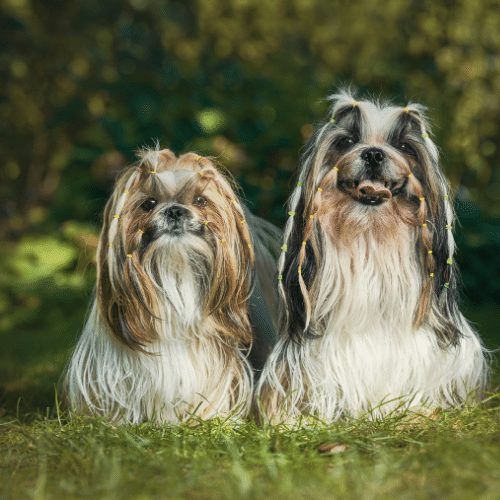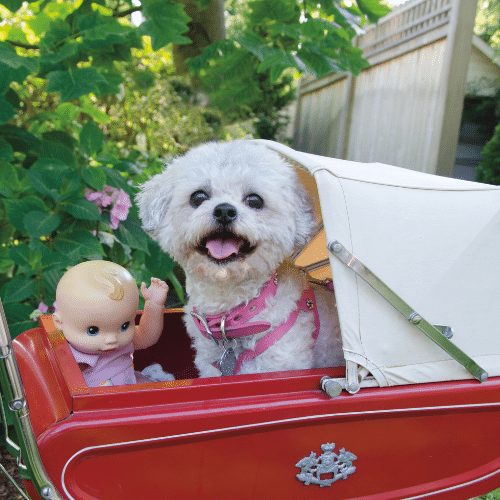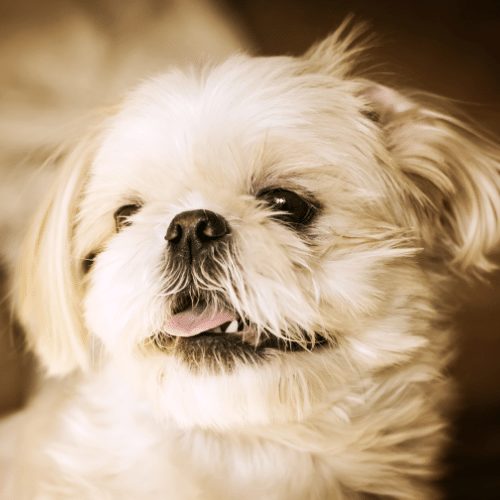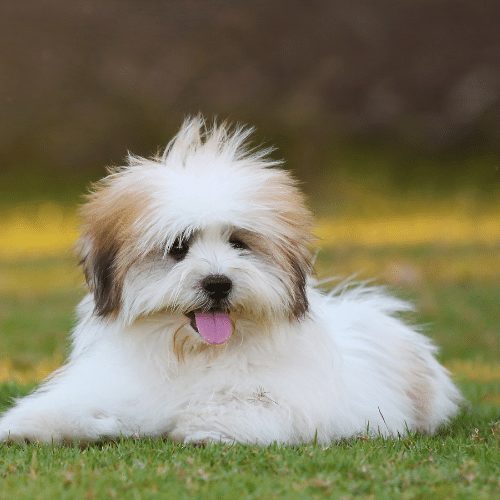Teacup Shih-Tzus
March 15, 2021 2021-07-14 5:58Colin Farrell has a Shih Tzu, Beyonce is rarely seen without her beloved Munchie, and the British monarchy owned them for years. It’s hardly surprising, though. The Shih Tzu is a small dog with a big heart who loves nothing more than hanging out with humans.
The Teacup version takes all of those lovable traits to a new level. A tiny dog with the heart of a lion, a Teacup Shih Tzu, will happily go everywhere with you, providing endless cuddles, irresistible cuteness, and undemanding companionship.
If there’s nothing you love more than something small and fluffy to cuddle, then you need a Miniature Shih Tzu in your life but, before you rush out and fall in love with one, there are a few things you should know about the breed.
They may not need a lot of space, but they do have some quirks that mean they’re not the ideal dog for everyone.
Table of Contents

Appearance
Cute as a button and almost as small, the Teacup Shih Tzu is literally tiny enough to fit into a bone china teacup.
Like its larger cousin, the Shih Tzu has a round, hairy head that has been compared to a chrysanthemum flower. The square muzzle is topped off with a black button nose that matches his round, black eyes – assuming you can find them under all that hair.
Despite its size, the Teacup Shih Tzu is a sturdy dog with a broad chest and short but well-muscled legs. His distinctive plumed tail curls up over his back, giving him a “distinctively arrogant carriage.”
Shih Tzus come in every color imaginable, although the most common is a combination of grey or black patches on a primarily white coat. Less common colors include a predominately grey or charcoal-colored coat with intermittent white flashes and the unusual red variety which often has darker coloration around the eyes and muzzle.
Size
Teacup Shih Tzus generally stand around six inches tall and weigh under seven pounds. In other words, they stand about three inches shorter than the standard breed that stands approximately 10 inches tall and weighs between nine to 16 pounds.
Other teacup breeds include the diminutive Chihuahua, the smallest of which is Guinness World Record holder, Milly, who, at less than four inches tall, makes a teacup look decidedly roomy.
Although small in stature, Miniature Shih Tzus are surprisingly robust and heavy. Compared to a Teacup Yorkie, for example, that stands a little taller at seven inches, the mini Shih Tzu weighs twice as much, sitting around 14 lbs, compared to the Yorkie’s seven.
Are Teacup Shih Tzus Easy To Train?
Intelligent little creatures, Mini Shih Tzus love learning new tricks and teaching their humans how to perform important tasks like retrieving treats from the pantry and settling on the couch for some serious cuddle time.
Although Shih Tzus are obedient, willing little dogs, they can become stubborn if not exposed to early puppy training.
Don’t forget, the name Shih Tzu means Little Lion, and these compact canines will fiercely protect their homes, humans, and, in some instances, their toys as well.
You’ll find your tiny dog responds well to positive reinforcement techniques, and employing these will have him quickly house trained and, in time, turn him into an excellent traveling companion.
How Much Exercise Does My Teacup Shih Tzu Need?
The Teacup Shih Tzu’s short legs mean it’s not designed for long-distance runs or lengthy bike rides, but that doesn’t stop them from enjoying a good walk or a game of fetch.
Despite their teddy-bear-like appearance, these toy dogs are surprisingly athletic and love outdoor adventures and daily walks.
If you’re sharing a small apartment with a Teacup Shih Tzu, you can “satisfy his need for activity by playing indoors several times a day,” but he’ll be happier given the opportunity to get out and about, meet other dogs, and explore the wider world.
Shih Tzus love treat-dispensing toys like the Kong, which stimulates their active minds and encourages them to develop their natural scavenging skills.
Having said that, like the standard Shih Tzu, the teacup variety is very much a lapdog and adapts well to a pampered life of luxury, hanging out with his human friends and soaking up all the love and cuddles that come his way.
Are Teacup Shih Tzus Good With Children?
Regardless of whether they fall into the standard size category or the teacup classification, Shih Tzus welcome the attention of any human. For the most part, they won’t give two hoots about that person’s age or size. Originally bred as companion dogs to the Chinese Emperors, these fluffy dogs are friendly, cheerful, and outgoing, making them ideal for children.
Getting your good-natured Miniature Shih Tzu to enjoy the company of kids is child’s play. That’s not to say you should leave your little lion unattended with kids, however. They may be cute, but not all teacup pups enjoy being dressed up or treated to endless new hairstyles.
Too much of the wrong attention could see your Shih Tzu running the other way every time a child comes into view. Supervision is also necessary to prevent your teacup pup from over-exerting himself. When young, “teacup puppies are fragile” and need a rest after about half an hour of play.

How Much Does a Teacup Shih Tzu Cost?
Don’t be fooled by their small size – in the case of the Teacup Shih Tzu, less is apparently more.
More expensive than their standard-sized cousins, which usually cost between $500 and $1000, prospective miniature Shih Tzu owners should budget for at least $1000 and be prepared to pay a hefty five-figure sum for a top-quality toy pup.
If you’re lucky, you may find a teacup pup for as little as $750, but you should still bear in mind, this is only the beginning.
You will also need to cover the usual expenses of food, grooming supplies or professional grooming services, toys, treats, and annual checkups.
Chances are, your miniature Shih Tzu will also rack up a few hefty veterinary bills during his lifetime.
Health & Care
Also known as the Imperial Shih Tzu, this diminutive dog is generally pretty healthy, but its small size does result in some unique issues and health requirements.
Inside the Teacup Shih Tzu’s body is a collection of tiny organs and fragile bones, all of which present certain challenges when it comes to keeping these dogs healthy. Their small stomachs “may not be able to digest solid foods properly because of their size,” potentially causing digestive problems as severe as malnutrition.
You may find you need to feed your little lion more frequently than a normal-sized dog as they are prone to hypoglycemia and because their small stomachs make it difficult to digest larger quantities.
The Teacup Shih Tzu’s cute little snub nose also gives him trouble, making breathing labored, and potentially causing stomach upsets if he ingests air along with his kibble.
Like its larger cousin, the miniature Shih Tzu is a brachycephalic breed, meaning it has a short head and flat muzzle. This structure can lead to breathing difficulties which, in the worst-case scenario, could require surgery.
Mini Shih Tzus are also prone to back problems, such as intervertebral disc disease, muscle spasms, and even disc herniation. To prevent these issues, try to spot your Shih Tzy from jumping on and off furniture, as this puts excess strain on both their backs and their fragile knee joints.
Despite their long, silky coats, Mini Shih Tzus struggle to regulate their body temperature and are susceptible to overheating. You should also consider getting a dog coat to keep him warm during the winter months.
No one wants a dog that struggles with its health, no matter how tiny and cute they may be, so it’s worth shopping around. Reputable breeders often provide an official health certificate for every puppy, along with “a 1-year health guarantee protecting against hereditary and congenital defects.”
Life Expactancy
A healthy Miniature Shih Tzu has the same life expectancy as a standard-sized version and should light up your life for a good 12 to 15 years. Yes, there may be a few health scares and costly veterinary bills along the way, but it will be well worth it.
Do Teacup Shih Tzus Need A Lot of Grooming?
One of the best things about a tiny Shih Tzu is that it doesn’t shed. One of the worst is how much grooming it needs to keep its coat free of mats and tangles. Of course, the Chinese Emperors who first owned these little lions didn’t have to worry about that – they had “a dedicated cadre of workers whose entire job consisted of grooming the privileged Shih Tzu’s!”
For us commoners, however, keeping a long-haired miniature Shih Tzu means daily grooming and regular trimming.
Selecting the right grooming supplies can be as challenging as sticking to a strict grooming routine. Slicker brushes are generally too big and too aggressive to use on your dog’s soft hair and fragile body. Smaller de-matting tools, like those designed for cats, work quite well, however, removing stubborn tangles and turning your Shih Tzu into a cuddly companion.
Many Shih Tzu owners use grooming clippers to trim their dogs in the summer to minimize the potential for overheating. A short puppy cut can transform your Shih Tzu into a sleek-looking canine athlete, whereas a teddy bear cut will, unsurprisingly, make him resemble a stuffed toy.
Like any other breed of dog, your Teacup pup will need its eyes and face cleaning regularly and its nails trimming every week. A weekly bath with a Shih-Tzu-specific shampoo won’t go amiss either.
Why Do Shih Tzus Smell Bad?
As adorable as they are to look at, Teacup Shih Tzus aren’t always the best dogs to snuggle with at night, primarily because they tend to smell!
This is by no means normal for any breed of dog but is something the Shih Tzus are more susceptible to.
The main factors that cause a stinky Shih Tzu are:
- Water and food caught in their facial hair, causing smelly bacterial infections;
- Long hairs dangling in the eyes leading to a build-up of bacteria;
- Backed up anal glands;
- Skin infections or irritations.
By examining your tiny dog regularly and thoroughly, you can help address these problems and give you a sweeter-smelling Shih Tzu to cuddle with.
Are Teacup Shih Tzus Aggressive?
With a name that means Little Lion, you can expect your Miniature Shih Tzu to display a spunky attitude to life, but not an overly aggressive one. To be fair, these little balls of fluff are more likely to lick an intruder to death than go at him with their teeth bared.
Most Shih Tzus, both the standard and the miniature varieties, are friendly, sweet-natured dogs, which is probably why they’re so popular. They are, however, small dogs and, as such, are prone to “small-dog syndrome,” which can make them fearful of and subsequently aggressive towards larger dogs.
For the most part, however, you can expect your Teacup Shih Tzu to be a friendly, outgoing, and playful soul, greeting strangers, children, and other animals with equal enthusiasm.

Is The Imperial Shih Tzu A Recognised Breed?
Even if you call it the Imperial Shih Tzu, rather than a Teacup, you won’t be able to show it in competition as it’s not recognized as a breed.
Some even go as far as to say the American Kennel Club (AKC) “does not recognize the Imperial Shih Tzu as an actual dog.”
According to the AKC’s breed standard, Shih Tzus should ideally measure “9 to 10½ inches; but not less than 8” and weigh between “9 to 16 pounds.” As you can see, at 6 inches tall and 7 pounds in weight, the Teacup Shih Tzu is instantly disqualified.
If you do want to compete with your Teacup companion, your best option is to join the Teacup Dogs Agility Association as it “provides a competitive venue for dogs of small stature without regard to breed or pedigree.”
The Bottom Line
While it might be smaller than a Little Lion, the Teacup Shih Tzu has just as much love to share. Its small stature belies its big personality, while its amenable nature has made it a popular traveling companion.
Celebrities and families alike enjoy cuddles and games with their Shih Tzus, relishing their intelligence and enthusiasm. While not without its quirks, the Teacup Shih Tzu can be an entertaining companion that adapts easily to indoor life and requires only minimal exercise.



